Trampoline
A Novel in five acts by
Robert Gipe
Our Story so far . . .
Over Thanksgiving weekend, our narrator, Dawn Jewell, stole three vehicles: her cousin’s four-wheeler, her uncle Hubert’s sorry Oldsmobile, and her cousin’s Silverado pickup. She crossed state lines in the Silverado, trying to get to her radio love, Willett Bilson, who broadcasts from his family’s station atop a mountain in southwest Virginia. Dawn is wigging out because her daddy is dead, her momma is a drunk, and her maternal grandmother—with whom Dawn lives—has drawn Dawn into a fight against a stripmine permit on Blue Bear Mountain. That grandmother, Mamaw Cora, also bought Dawn gas for the Silverado and encouraged her to take it on the lam. At the end of Escape Velocity, the first section of this story, Dawn talked about an astronaut floating loose in space to a hateful waitress and decided to come home.
Read Act One, Escape Velocity, from Trampoline
Part One: Driving Lesson
Part Two: Smother
Part Three: What Hurts
Reckoning
Part One: Dead Cow in the Creek
I never should have stolen Denny’s truck. Not without my license. Or my glasses. And not if I wasn’t going to steal it for real. But I had to get out of Canard County. I had to lay my hand to the cheek of Willett Bilson, put a face to the voice on the radio. And I almost made it. I got to the foot of his mountain cross the state line in Virginia, but I lost my nerve. So I come home.
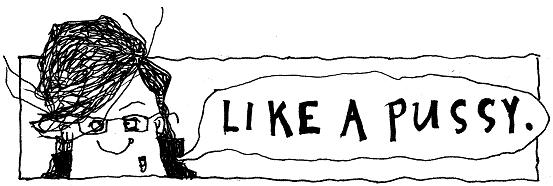
I drove up Drop Creek to take Denny back his truck, but he was gone. They all were. I sat down on the swing on Denny’s daddy’s porch. Its chains creaked like a coffin lid. The snow came down in clods, piled up at the edge of the porch’s unpainted boards. Denny’s daddy had a pretty place. Grass gouged up through the snow. Stuff for the kids was strung all over the yard. Pine mulch lay thick under the shrubs. Nothing I wanted, but still. Denny’s doublewide faced his daddy’s place. It had a porch with red latticework underneath it. White Christmas lights dripped from the gutters and wrapped through the neat little trees and bushes in the yard.
I went in Denny’s daddy’s house. It smelled like cinnamon and coffee. I called Evie to come get me, but she didn’t answer. I sat down on the couch. Without my glasses, the deer head over Denny’s daddy’s chair was all fuzzy. I walked over and got up in its face. Its hard black eyes and too-shiny nose come clear. “Sucks to be you,” I said to the deer head.
An old woman’s voice came from a bedroom back down the hall. “Come here,” the voice said, but it didn’t sound like two words. Sounded like one, like this: “Kmeeer.” It came in pairs too: “Kmeeer. Kmeeer.”
I went to the back of the house. Mamaw’s sister, the one lives in Ohio, lay on the carpet beside Denny’s mommy and daddy’s bed, flat on her back, drunk it seemed from how loud she was and the way her eyes played in their sockets. Her hair spun loose around her head like cotton candy,
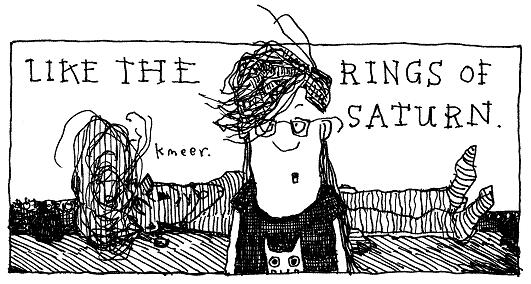
“Kmeeer.”
I did and she said, “You’re Cora’s girl,” and I said, “She’s my grandmother,” and she said, “You know she took my man,” and then she fell off to sleep, her head laid off to its side like a chicken ready for the ax. Mamaw’s sister. Aunt Ohio.
When she talked she sounded mountain, which wasn’t the way she talked normal. Normal she talked through her nose all buckeye about stuff like everywhere they ate on the way down here and what they had at each stop. She told us about every chicken nugget, every drop of honey mustard sauce. She was aggravating. I watched her sleep a while. Normal boring church pictures of Denny and his brothers and their wives and kids in flimsy picture frames crowded the tops of the chests of drawers.
I was chickenshit was what I was. That was why I was back in this shitty spookhouse county. Without the courage of my convictions, Mamaw would say. Aunt Ohio started snoring. I went in the kitchen, stood in front of the refrigerator looking at the Thanksgiving leftovers, the wads of foil, the piles of Ziploc bags. I took a pop and left in Denny’s truck and come back to Mamaw’s house on Long Trail.
~~~~~
“Why’d you steal Hubert’s beer, Dawn?”
It was hard to answer with my brother Albert’s arm clamped around my neck.
“He said you drove off with his beer.”
The night before I stole Denny’s truck, I stole my uncle Hubert’s Oldsmobile and drove it off the side of Astor Mountain. I rolled it at least three times and crashed it into the side of a hickory tree. Three days before that, I’d busted Albert’s jaw at school. Beat him bloody with my French book and put him in the hospital for Thanksgiving. And this is what was on his mind when I got home—the beer in the back of Hubert’s vehicle when I wrecked it.
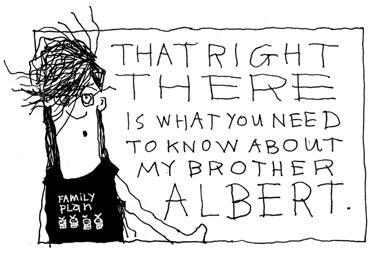
Albert tightened his grip around my neck. I could feel his breath against the back of my ear. He was hunched up behind me, trying to hook his leg around mine, get me on the ground. I tried to reach back and get his hair, but they’d shaved his head, at the hospital I guess. I tried to grab him low but he wouldn’t let me get a hold of him. We spun round and round on Mamaw’s patio, concrete all slushy. Albert finally got me down, drove my face into the snow in the yard.
“Where’s it at, turd?”
He’s so stupid. I couldn’t tell him with my mouth full of snow. I had twenty pounds on Albert, probably thirty, so when he tried to pin my arm behind me, I threw him off and got on my feet. He grabbed at my ankle and I turned one of Mamaw’s steel patio chairs over on his hand. Edge of the steel caught him across the fingers and I figured it cut a couple off, but he jerked his hand back and all his fingers come with it. Me and Albert had been fighting my whole life. Just like that, like crazy people. I was sick to death of it.
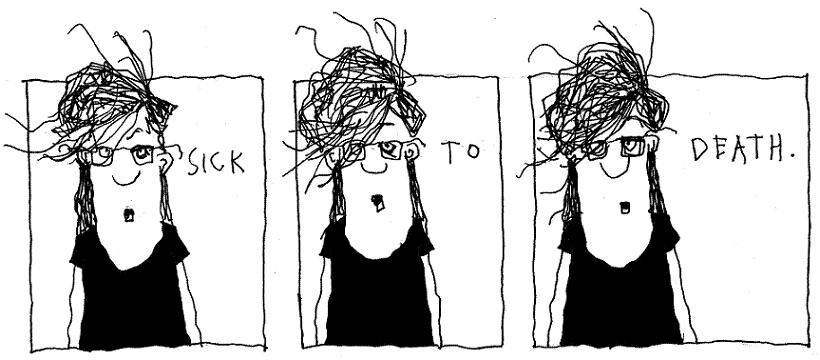
“It’s just beer,” I said.
Albert stood up. He raised his lip at me, showed his teeth like a dog. “Wait til Hubert gets out and gets ahold of you.”
“Shut up, Albert.”
“He aint gonna turn loose of you so easy.”
I smacked Albert’s finger out of my face.
“You better calm down,” Albert said. He sat down in the patio chair.
I stood over him. “What do you mean, ‘when Hubert gets out’?”
Mamaw stood on her tiptoes looking out the window over the sink at us.
Albert said, “Hubert’s in the Wise County jail.”
“What for?”
“Him and Cinderella got into with it some chicks over there.”
Mamaw tapped on the window.
Albert said, “Give me a ride back to Hubert’s.”
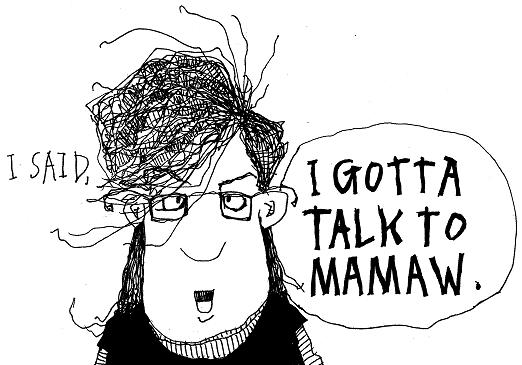
“Come on, little mermaid. Let me ride in your new truck.”
“Get there the way you got here, asshole.”
Albert sat in the patio chair like the prince of winter. He belched and steam shot out his mouth. “Give me a ride little mermaid.”
With both hands on his shoulders, I knocked his chair over, left him laying there, and went in Mamaw’s house.
~~~~~
“Did you make it home?” Mamaw said in a voice dry as flour, getting up from the kitchen table where she was reading coal mining permit papers.
I sat down, put my head on the table. The vinyl tablecloth was sticky with sugar. I could feel it against my forehead.
Mamaw said, “You want some milk?” She brought me a glass of chocolate milk and sat back down. She put her hand on my hair.
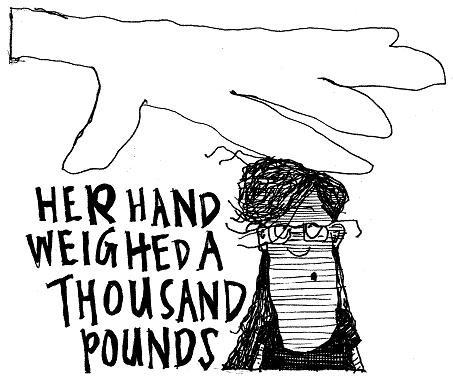
“Your sister’s passed out in the bedroom at your brother’s house,” I said without raising my head.
“Do what?” Mamaw said.
I told her what I seen and where I seen it.
“Hunh,” Mamaw said.
“What’s she talking about, you took her man?”
Mamaw looked at me a minute. “Don’t pay no attention to her. She’s lost.”
It didn’t bother Mamaw to be alone. Maybe she was preparing me for the same. Mamaw got up from the table, went over to where she kept her papers stacked, come back, set my glasses down in front of me.
“Your cousin Denny brung them,” Mamaw said.
My glasses had been cleaned, screws tightened. Shined up. Mamaw set back down to her business. Didn’t say nothing, but she wasn’t reading, just shuffling papers, waiting for me to say something. That was her being there for me. Hell with that, I thought. My leg was bouncing I was so mad. To calm myself down, I thought how Mamaw took me and Momma in when things at Hubert’s got crazy. I thought how she took me walking in the woods when I was agitated. I got up and went out on the patio. Albert was gone. The air smelled of coal smoke from my papaw Houston’s house back up on the hillside. I could see him in my mind, surrounded by his music, fire going in the stove, not like pioneer days, not that old feeling, but like something you couldn’t find no more in the world today.
Everything was blue and gray out. It was so quiet I could almost hear Houston’s fire cracking and popping. My cheeks were numb.
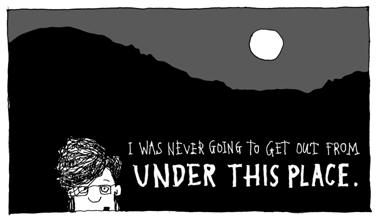
Kmeer. Kmeer. I walked towards Houston’s. Halfway up the hill, I looked back at Mamaw’s, light orange in the kitchen. I was starting to stink. Good time to go see Houston. Didn’t matter how you smelled at Houston’s.
~~~~~
When I pushed open the door, Houston sat in the front room baked by coal fire, glazed in his own grease, his face sawed open in a smile. A man on a 78 rpm record sang “the cuckoo, he’s a pretty bird, and he wobbles as he flies.” An idler and a thief is what Mamaw called Houston, but I never seen him idle. He was always out trading with somebody or fishing goods out of the river. Or holding something up to the light to check on how clear it was. Clarity.
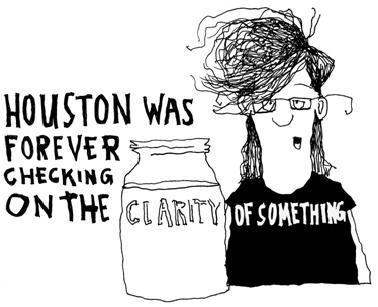
“Hey oh,” he said when I come in the door. “Is it a haint? Or the darling Misty Dawn?” He leaned up on the heels of his hands in the arm chair. “Get to the icebox, little sister. Fetch out a jar.”
I set the jar and a glass with painted flowers on it down at my grandfather’s elbow. Houston fixed a glass of the cold clear liquor and handed me the jar to put back in the icebox. I slumped in a chair across from him and fell off to sleep.
“Go back there and lay down on the bed,” Houston said when I opened my eyes.
I did, between the birdblue electric blanket and the ancient brown chenille spread, the light fuzzy through the window plastic. I dreamed I heard Willett Bilson’s voice and I lay waiting for it to turn into a body. I wondered did Willett Bilson have chest hair and how it would be around my finger.
Houston’s dogs whined and barked in my sleep. I woke annoyed, wishing Houston would make the dogs stop. Houston came in the room, said, “I reckon she’s asleep,” to the dogs. The dogs sniffed my face. It was dark outside. The yellow lamp lit the window plastic.
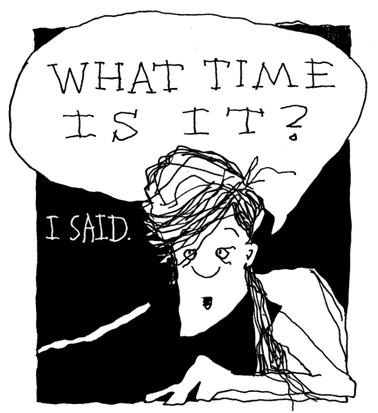
“Time to eat,” Houston said. “If you want.”
“I should go back to Mamaw’s.”
“Coming down pretty good out there.”
A dog licked my hand. I said to Houston, “What did you do for Thanksgiving?”
“I was supposed to go to Kingsport to see daughter June, before all this snow.”
The dog licking my hand was wet, and missing an eye.
Houston said, “Nobody brought me nothing to eat.”
The dog lay its head on my hand.
“I thought maybe that’s what you was doing. Thought maybe Cora fixed me a little plate of turkey and dressing. Maybe some sweet potatoes. With them little marshmallows melted down over em.”
“Nah.” I stood up. The one-eyed dog crawled under the bed.
I don’t remember Houston ever living under the same roof as Mamaw. When I was little he lived in a block building out in Mamaw’s driveway next to the carport. Momma told me Mamaw and Houston used to have a photography studio together, used to spit and fuss together every day of their lives. But Mamaw kicked him out and kept kicking him til she’d kicked him up here on the ridge.
“Well then,” Houston said, “you want some stew?”
The dogs trailed Houston out of the room. I followed. Houston browned meat and cut up carrots and onions and potatoes and put salt and pepper on them and poured soup out of a can into it. Houston sipped from a coffee cup.
“Your grandmother was a nurse. How I met her. She was taking care of my head. Where I fell out of the back of a truck.”
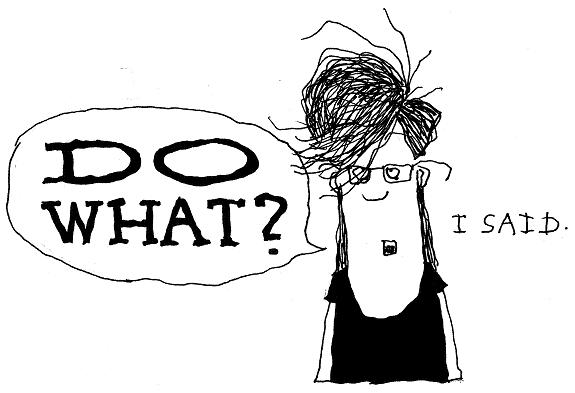
“Hit wasn’t moving. It was sitting in her driveway. At her daddy’s house. Drop Creek.”
A dog stood on a rag rug next to the stove and shook water off itself.
“So,” Houston said, “you courting?”
Albert told me one time he heard Houston was fooling around with a woman come in their photo studio for some glamour shots and Mamaw almost beat her to death with a camera tripod.
“I better go Papaw.”
“I done called your mamaw. Told her where you was at.”
“What’d she say?”
“Said I could keep you. For the night anyway.”
Houston set the stove eye on low and headed back to his chair in the front room.
“Course I’d had my eye on her long time before I fell out of the truck. Your grandmother was real good with makeup. She didn’t hardly wear none. But what she wore worked like a charm. Bright. like a bird in spring. We took her picture, me and daddy. I made me a copy, packed it around til one day it fell out of my schoolbook. My buddy found it and give it to her. Boy, was she mad. She didn’t want nobody having no part of her. At the time I thought it was me she didn’t favor, cause I wasn’t no slight airborne woodland creature of bright plumage and easy means of escape like her. I was earthy. A salamander at best, but more like a grub, something beneath the bark of a tree, at home in soft wood, something a bird like her, with her sharp beak and bright plumage, would feed on.”
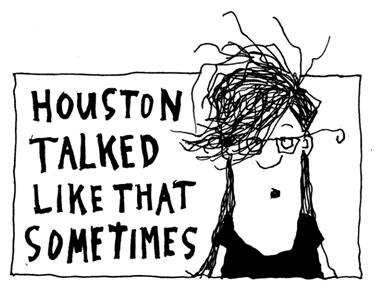
He said, “I wore her down though.”
“Didya.”
“One May I thought I was possessed by the devil. I wasn’t of course. It was just a kidney infection. But her preacher uncle convinced me was the devil. He hollered and mashed my head between his hands til the spirit flew out in the yard and holed up in my Chrysler. Her preacher uncle dumped gas on that car and set it blazing. To get that devil out of it.”
“Did it work?”
“Go see for yourself. It’s still sitting up Drop Creek.”
“Hunh.”
“Your mamaw sort of took pity on me after that, and I got in there that way, you know.”
I didn’t quite believe Houston, but I ate his stew, and stayed at his house that night. He left me alone, played 78 rpm records out in the front room and when I slept, I slept like I was dead.
~~~~~
Saturday morning early, there was a knock on Houston’s door. Houston never stirred. I got up and opened the door. It was Aunt Ohio with a bunch of food. Houston came into the kitchen as Aunt Ohio come in the house.
“Verna,” Houston said.
Behind Aunt Ohio out Houston’s door, the sun came out. Water dripped even across the length of the eave. The ground was solid snow, but shiny.
“How are you, Houston, honey?” Aunt Ohio had her hair done up tight. Her makeup was crisp as frosting on a cake in the glass case at the grocery store. She wore high-waisted jeans and shoes for walking. She set all them Ziploc bags and wads of foil from Denny’s daddy’s refrigerator on the counter. She had most of a ham. Half gallon jar of tea. Better part of a pie.
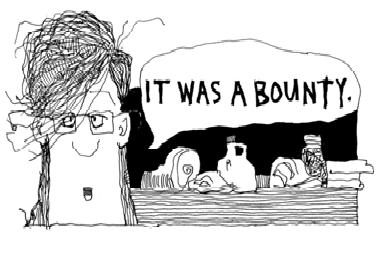
Aunt Ohio said, “Houston, what time you coming to see us? You know it aint Thanksgiving til you come out. Them boys love your stories. We all do.” Aunt Ohio pulled Houston’s head over, kissed him right on its top.
“Where’s Gene?” Houston said.
Gene was Aunt Ohio’s husband used to manage a metal garbage can plant in Ohio before things went plastic. Houston told me one time Gene give him a job. Said it was the best job he ever had.
“Down at Cora’s,” Aunt Ohio said. She went to the icebox and took out the jar.
“Verna, I don’t know I’m going to get out to Drop Creek this year.” Houston’s Adam’s apple bobbed up and down more than usual. “Gout giving me fits.”
Aunt Ohio leaned on her elbows on the kitchen counter. She was trying to look appealing. On Drop Creek, she was the person knew the rules to the card games and didn’t care to tell you. She was the one said the mashed potatoes weren’t hot all the way through. She never tried to be appealing on Drop Creek. Aunt Ohio turned her smoky eyes on Houston.
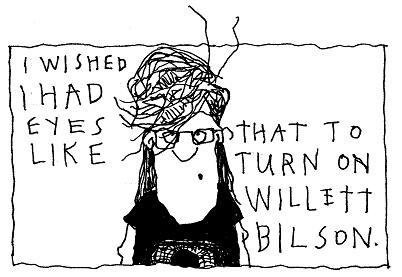
Houston licked his chops over that ham. I did too. Houston got a bag of whitebread off the top of the icebox. He laid it on the counter, got the yellow mustard out. Aunt Ohio’s smoky eyes followed Houston to the icebox, to the counter, back to the icebox. The air was filled with honey-glazed tension. A car horn honked. Aunt Ohio stood up. Houston pulled a slice of ham off the bone. Aunt Ohio moved to the door and waved at Gene. She turned.
“Goodbye, Houston.”
Houston took two pieces of bread from the bag. “Adios,” he said, pronouncing it ‘add-ee-ose.” He laid the slices out on the counter and smeared yellow on both.
“Hope that gout don’t get the best of you,” Aunt Ohio said with a smile. She turned to me. “Dawn,” she said. And then she was out the door, which slammed behind her.
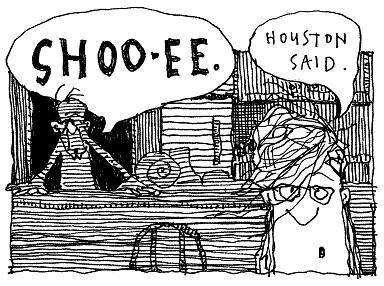
The liquor set on the counter next to the mustard. Houston lay down his knife and tipped the liquor jar.
“Phwoo,” he said when he set it down.
“What was that?” I said.
“You’ll have to ask her.”
Sunbeams leaned through the window. The dogs ganged up at the door, scratched the aluminum, dragged their noses across the glass.
“I’m asking you, Papaw.” I walked to the counter and put the jar to my own lips.
“I have not always been the gentleman you see today.” Papaw finished putting together his sandwich. He went to the cabinet, pulled a plate from a pile of plates, set the sandwich on the plate. He came to his chair. “I did not used to be so comfortable in my own skin,” he said.
“Your own skin,” I said.
“Let the dogs in,” he said.
I did. They looked this way and that, set up underneath the ham.
“I used to get agitated,” Houston said.
“Hunh.”
“Used to lose my sense of myself. Had to go elsewhere to figure out who I was.”
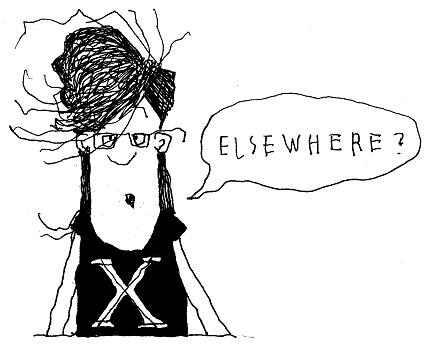
“Only so much a man can figure out at home.”
“So who’d you love more? Mamaw or Verna?”
Houston chewed his sandwich, licked mustard from his lips, took a dreamy look.
“First one thing and then another,” he said.
The dogs settled down around us. They wagged their tails.
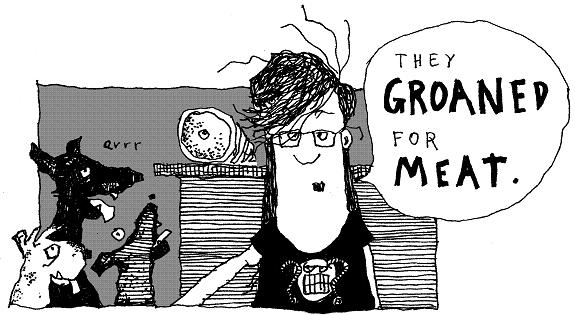
Houston said, “There is a pain in watching others eat known only to dogs. They pretend to like us. But they are filled with anger at how unfair the world is.” He put the last of his sandwich in his mouth. “You are too young for us to drink enough for me to tell you of my courtship of your grandmother and her sister. There are doors through which it is not yet time for you to walk.”
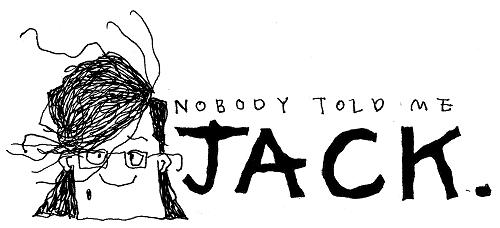
My life was one long river of bullshit.
“I will say this.” Houston put his knotty finger to his eye. “Fear men. Flee them. Give them nothing. They mean you ill. Their voices smack of honey and their words set off string music in the chambers of your heart. But mark my words: they will cut you down, chop you up, cook you over fire, eat only the pieces that suit them, and throw the best of you into the weeds for other beasts to rend and gnaw.”
Houston pulled on his coat and went out into the snow, dogs on his trail in a barking wad. His yard was full of sunshine and puddles. I went back to bed.
~~~~~
When I woke, clouds covered the sun. I lay there in a twist, thinking I wasn’t nothing, and wasn’t never gonna be nothing. Living was gonna be one long disastrous horrifying embarrassment.
Houston was the best man in my life since Daddy died and he wasn’t for shit. I was eight years old when Daddy died. People say you can’t be happy til you know what you want.
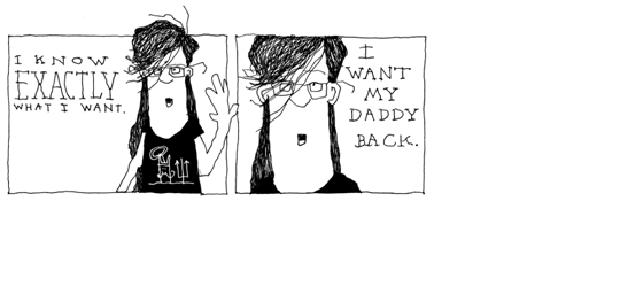
Right before he died we went to his momma’s house in North Carolina and he set at dinner and told a story about a boy named Jack tying death up in a sack and I thought it was real. I never heard him tell a story like that and my mouth hung open and that’s what haunts me, that every day I would have learned something new and good about what my daddy was.
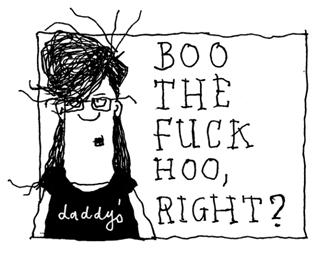
I turned on Houston’s portable radio with its rotted-off leather handle and red needle set on Willett Bilson’s station. Two tobacco farmers were playing jazz records.
“Now that there was John Coltrane,” one of them said.
“Hello there, Mr. Bilson,” the other jazz farmer said. “How are you this fine morning?”
“Just dandy,” said Willett Bilson. “Up with the chickens.”
Willett Bilson made a clucking noise and the jazz farmers laughed. I don’t know why I was taken with the voice of Willett Bilson. It didn’t seem like something I would like. Too goody goody. I should have thought him stupid. But I didn’t. I lay there in the bed and waited through a show-offy saxophone song to hear him again.
“Man that was some playing,” said Willett Bilson. “I feel taken away, transported, swept right up off of this mountain to the bustle of New York City. Fresh air. Times Square. You are my wife. Goodbye city life. Heh.”
There was a pause and the old jazz farmer said, “Well, that’ll just about do it for us,” and they signed off and Willett did a show by himself, playing music and announcing Christmas pageants and Santa Claus giveaways and a hog killing. He talked slow and appreciative about the beautiful morning—“the frost, friends, has created a jewel box out our window here.”
I worked Willett Bilson up in my mind. I didn’t think he would be super hot. But his reedy voice made him tall in my imagination. Maybe some kind of red hair. Maybe thick and curly. Maybe freckles. I drifted back to sleep, and woke when Mamaw called to say Denny was at her house looking for his truck.
~~~~~
Denny came to pick up his truck with a guy from work. The guy wore a ball cap and looked at me hard. His look said, ‘I have a life and it is a good life, a life of laughing and closeness and fun, and you aint never gonna be a part of it, weirdo treehugger girl.’ Mamaw knew the boy. He had been to her house before. She had been to his. Mamaw had been a school nurse. People knew her that way besides her being a tree hugger. She had saved all kinds of people all kinds of money on doctor’s bills. She had that going for her besides what she was doing trying to stop a strip job.

There wasn’t any ‘well but’ with me. I was a freak, soft and four-eyed, with black fingernail polish, a dead daddy, a drunk momma, a crackhead brother, outlaw uncles, and divorced grandparents who made trouble for normal people every time they come off the ridge.
Denny smiled at me with his eyes. He put his hand out, and I put the keys in it. He nodded and turned to get in his truck.
“That’s it?” his friend said. “Just take the keys and go?”
“I reckon,” Denny said.
“I’ll be damned,” his friend said.
Denny opened the truck door.
“What would you say,” I said, “if it was your truck?”
“Dawn,” Mamaw said.
Denny’s buddy turned to face us. “Wouldn’t say nothing,” he said. “I’d a called the law. Had you put in jail. Lawless thing. Wouldn’t matter if you was my cousin.”
“Lawless,” I said, “like when yall mine off your permit, and blast ten times more than you’re supposed to, build ponds where you aint got no permit, lie on your water reports—lawless like that?”
“You need to shut your mouth,” Denny’s buddy said, “cause you don’t know what you’re talking about.”
“What,” I said, “break a law on a bulldozer and it aint a crime?”
“I work,” he said. “That would be something you don’t know nothing about, you truck-thieving little freak.”
“Yeah, well,” I said, “drug dealers work.”
“I guess you’d know about that,” he said.
“I’d be glad to go to jail,” I said, “if they put me in right next to you.”
He come around the truck wanted to get up in my face. Mamaw put her walking stick between me and him.
“That’s enough,” Mamaw said.
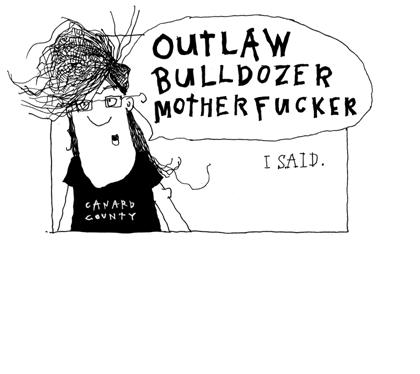
“This aint a game, little girl.”
I flipped him off. Mamaw knocked my hand out of the air.
“Let’s go, Keith,” Denny said.
“Yeah, go on, Denny,” I said. “You pussy. I’m glad I stole your truck. You stripmining pussy with your pretty Christmas lights and your chrome-plated doublewide. Go the fuck on.”
“Yall get on out of here, Denny,” Mamaw said.
Denny didn’t say a word, just got in his truck. His buddy tried to stare me down. He didn’t have nothing to say. What was he going to say? What I said was true. He knew it was. I flipped him off again. Soon as I did that last flip-off, I wished it all back, like I had at the hearing, except this was worse. I had made it personal with Denny’s friend. Way too personal. Denny and his friend left in the snow, sliding and slipping down through the gravel of Mamaw’s drive to the blacktop.
“You been paying more attention at them meetings than I thought,” Mamaw said.
“What’s that boy’s name?”
“Kelly. Keith Kelly.”
My head spun. I wanted to be back at Houston’s, old music playing.
“Reckon we’ll see them again when this snow melts,” Mamaw said.
“What are you talking about?”
“We’re going up there and inspect that strip job.”
“By ourselves?”
“State man go with us.”
“Us who?”
“Me, you. Anybody we want to take.”
“When?”
“Supposed to clear Thursday.”
I walked over behind Mamaw’s snowball bush. I put my hands on my knees to throw up. I coughed. I spit. Mamaw came over, put her hand on my back. I stood up.
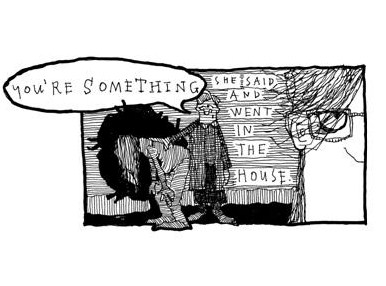
I was cold and filthy from sleeping at Houston’s. I wanted so to go in Mamaw’s and take a shower, but I did not want to have to talk enviro-fighter strategy with Mamaw. I wanted to go somewhere and be clean and beautiful. I wanted to wear a dress. I wanted to have my picture made. I wanted to rest my hand in the crooked elbow of a boy who loved me. I wanted our favorite song playing. I wanted my head on his shoulder.
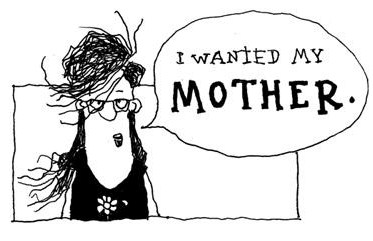
I tried to think where my mother was. The last I had seen of her, she was in the rear view mirror of the Delta 88, high, trying to break up the mess between Cinderella, Hubert, and the party girls. Did she have to go to jail with Hubert? I didn’t figure she did. Albert would have said so. She was probably at Hubert’s. How did she get back from Virginia? I left her there without a ride. Who would I ask? I did not want to ask Mamaw. She probably wouldn’t know anyway. Hubert was in jail. Houston wouldn’t know. I could ask Albert.
“Honey, come in from the cold,” Mamaw called from the doorway. I saw in Mamaw’s face how crazy I looked.
“Where’s Momma?” I said.
“Come inside, Dawn.”
When I got inside, Mamaw told me hadn’t nobody seen her.
“She aint in jail?” I said.
“No.”
“Then where’s she at?”
“I don’t know.”
“Who does?”
“I don’t know.”
“You ask Albert?”
“I did.”
“What’d he say?”
“He don’t know.”
“Shoo.”
“I even asked Cinderella.”
“You know Cinderella?”
“I do.”
“What’d he say?”
“He don’t know.”
Out the kitchen window, Mamaw’s Escort sat in the carport. Mamaw kept her car cleaner than her house. Clean. A slight airborne thing. It was Thanksgiving Saturday and the men would be back at Denny’s house. The women might be doing their in-county Christmas shopping. The men were sitting around watching television, watching somebody beat the shit out of UK. Denny would be back with them in a minute. Him and Keith Kelly. My new enemy. Monday I go back to school.
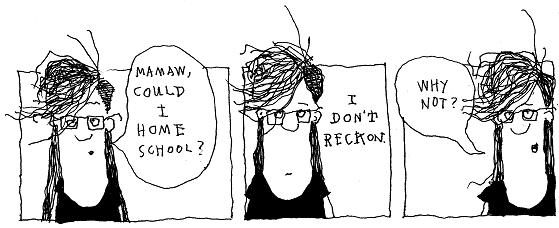
Mamaw paused. “You scared to go back?”
Why did she have to put it that way? “No.”
“Dawn?”
“What?”
“She’ll be all right.”
“How do you know?”
“I don’t.”
I turned from the window, looked around the kitchen, turned back to the winter light.
Mamaw said, “Why don’t you go outside?”
“Cause it’s freezing.”
“Want to walk with me? Clear your head.”
I stared out the window. Mamaw looked at me a long time, like I was a dead cow in the creek she couldn’t figure out how to move.
“You want some hot chocolate?” she said.
I shook my head. She stood there some more. Dead cow still in the creek.
“You don’t have to do this,” she said.
“Don’t have to do what?”
“You don’t have to be involved with this Blue Bear business. You don’t have to go. You don’t have to speak.”
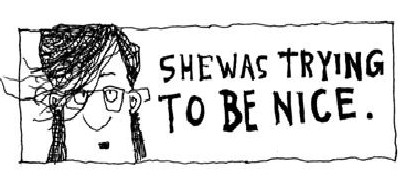
She knew it was too late for me to back out. I nodded. “Yall are right about what you’re doing. Somebody’s got to say it.”
I thought Mamaw might move towards me. But she didn’t. She put away dishes. She moved things from one end of the room to the other. She picked pieces of fuzz off her sweatshirt.
“Your momma’s been living the way she’s living for a while now,” Mamaw said.
“I know.”
“Aint there no other kids at school,” Mamaw said, “feel the way you do about Blue Bear?”
“Not that I know of.”
Mamaw nodded. “Well,” she said.
I went in my room, changed my clothes.
“You gonna take a shower?” Mamaw said.
I put on clean jeans, a high neck shirt, longjohns, a hoodie, two pairs of socks.
“I’m going out,” I said. “I can’t think.”
“Well,” Mamaw said.
I stood at the kitchen door. “I’ll see you.”
“You want something to eat?” Mamaw said.
“Nah.”
“You going up on the ridge?”
“I reckon.”
“Here.” Mamaw went to her coat pocket behind the door, got me her pipe, her tobacco pouch. I held them in my big hand, tucked them in the front pocket of my hoodie.
“Helps me,” Mamaw said.
“Does it?” I said.
Mamaw tucked her chin and smiled. Mamaw was so strange. The house ticked like a clock. Tick. It was the heater. Tick.
“Mamaw?”
“Yes, honey.”
“Would you rather I was alone?”
“Do what?”
“You wish I was by myself all my life? You rather I live that way?”
“Honey, no. I wouldn’t wish that on a dog.”
I bowed my head. Mamaw came to me. She closed me up in her arms. I was so much bigger than her. Big. A big girl.
Mamaw said into my ear, “I’m doing my best, honey.”
~~~~~
I walked out the door like I was leaving for good. That’s always how I felt when I went out in the snow.
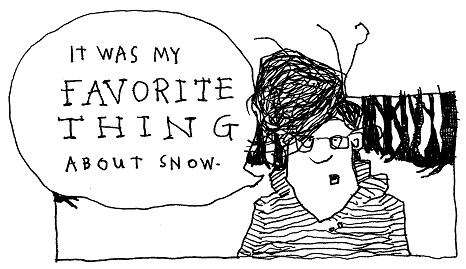
Houston wasn’t at his house. I put a pint jar in my hoodie pocket and headed up on the ridge. The trees against the snow-white sky were like words on paper. I tried to read what they said. In a beautiful mystical nature language that no one could understand but me they said for me to kiss their ass. I am not a nature girl, see. Don’t camp. Don’t fish. Can’t tell which animals are which by their poop. I just wander the woods. All. By. Myself.
The snow squeaked under my feet. I lost my breath when the way got steep. I sat down on a boulder and sipped from the jar. Corn liquor. Made by some ancient craft. The children I was gonna have or not danced at the edge of my eyes. When I turned my head towards them, they were gone. I didn’t think about Denny. I didn’t think about Keith Kelly.
“Til this year I thought you was a boy.” That’s what the only boy who ever said he liked me said the first time he got me by myself. I sipped from the jar.
‘Mamaw,’ I said in my head.
‘What?’ she said in my head.
In my head I said, ‘Remind me what I’m missing doing home school.’
In my head, Mamaw laughed. Ha. Ha. Ha.
I got drunk in the snow, on a narrow patch of land Mamaw owned. Hell deep. Heaven high. No divided mineral. Do you know what I mean? Fuck you if you don’t. Do you remember what it was like to be fifteen? Do you know what it is like to grow up in Kentucky? Either you do or you don’t. Aint no use explaining if you don’t.
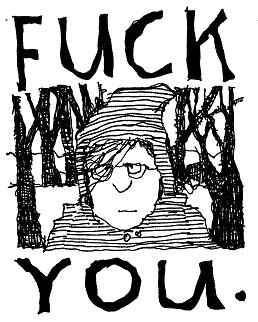
I moved through the snow. I wished I had a dog with me. I turned to see if one of Houston’s dogs followed me. I took out the jar again so as not to think about what it meant that not one of Houston’s dogs followed me.
Snow and trees gave way to snow and rocks as I climbed. ‘Fresh,’ I said to myself. Everything was fresh. ‘Maybe,’ the wind said to my face, ‘maybe you should cut yourself off with that liquor.’ I sat on a rock at the crest of the ridge, exhaled. Everything to the north of us sprawled out in front of me. ‘Cut yourself off,’ I said to the wind.
I took out the pipe and pouch. I did not have a lighter. I did not have fire. I stood up to kill myself. I looked down. There was a ledge ten feet below. I could jump down on that to practice kill myself.
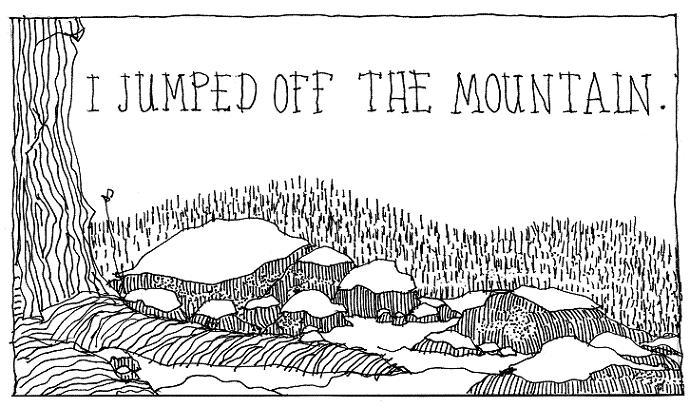
End Part One
Read Act One, Escape Velocity, from Trampoline
Part One: Driving Lesson
Part Two: Smother
Part Three: What Hurts
≈
Author's Statement:
I was born in North Carolina in 1963 and was raised in Kingsport, Tennessee, a child of the Tennessee Eastman Company, Pals Sudden Service, and the voice of the Vols, John Ward. My dad was a warehouse supervisor and my mom a registered nurse. I went to college at Wake Forest University in Winston-Salem, North Carolina where I was a DJ for a student radio station I helped start. I went to graduate school at the University of Massachusetts at Amherst and got a masters in American Studies. I worked as a pickle packer, a forklift driver, and eventually landed a job as marketing and educational services director for Appalshop in Whitesburg, Kentucky, in 1989. At Appalshop I worked with public schoolteachers on arts and education projects. I met my wife, Robin Lambert, at a conference in 1992, and we bonded over an interest in rural communities and an opposition to school consolidation. We married in 1993. She is my heart's delight. Since 1997, I have been the director of the Appalachian Program at Southeast Kentucky Community & Technical College in Cumberland, Kentucky. I am one of the producers of Higher Ground, a series of community musical dramas based on oral histories and grounded in discussion of local issues. I am also a faculty coordinator of the Crawdad student arts series. I have had fiction published in Appalachian Heritage and have attended the Appalachian Writers Workshop in Hindman every year since 2006.
I have been working on the characters in Trampoline since 2006. The narrator is Dawn Jewell. She lives in a coalfield county in eastern Kentucky, and is in high school when the story takes place. She's having a rough go of it.
The sound of people telling one another stories is the most precious sound in the world. Trying to catch that sound on the page is my favorite part of writing. Most of my favorite writing—Flannery O'Connor's stories, the novels of Richard Price and Charles Portis—seems to me written by ear. When writing is going best for me, it's like taking dictation from voices I hear in my head. As far as the drawings go, I have drawn pictures all my life, much longer than I have written stories, and with more compulsion. Trampoline is the first time I have seriously tried to integrate fiction and drawing. I love episodic storytelling, especially the great HBO series—The Wire, Six Feet Under, Deadwood, etc.—and have enjoyed thinking about how to break a story into semi-coherent pieces.
—Robert Gipe
≈
